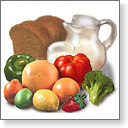| Vegetarian diets |

Vegetarian diets can be healthy because they are often lower in saturated fat and cholesterol and higher in fiber. Choosing a vegetarian diet with a low-fat content can be helpful for weight loss. But vegetarians -- like non-vegetarians -- can also make poor food choices, like eating large amounts of junk (nutritionally empty) foods. Candy, chips, and other high-fat, vegetarian foods should be eaten in small amounts.
Vegetarian diets need to be as carefully planned as non-vegetarian diets to make sure they are nutritious. Vegetarian diets can provide the recommended daily amount of all the key nutrients if you choose foods carefully. Plants, especially fruits and vegetables, are the main source of nutrients in vegetarian diets.
Some types of vegetarian diets (like those that include eggs and dairy foods) contain animal sources, while another type (the vegan diet) has no animal foods. Nutrients normally found in animal products that are not always found in a vegetarian diet are iron, calcium, vitamin D, vitamin B12, and zinc.
Here are some foods that have these nutrients:
- Iron: cashews, tomato juice, rice, tofu, lentils, and garbanzo beans (chick peas).
- Calcium: dairy products, fortified soymilk, fortified orange juice, tofu, kale, and broccoli.
- Vitamin D: fortified milk and soymilk, and fortified cereals (or a small amount of sunlight).
- Vitamin B12: eggs, dairy products, and fortified soymilk, cereals, tempeh, and miso. (Tempeh and miso are foods made from soybeans. They are low in calories and fat and high in protein.)
- Zinc: whole grains (especially the germ and bran of the grain), eggs, dairy products, nuts, tofu, leafy vegetables (lettuce, spinach, cabbage), and root vegetables (onions, potatoes, carrots, celery, radishes).
Vegetarians must eat a variety of plant foods over the course of a day to get enough protein. Those plant foods that have the most protein are lentils, tofu, nuts, seeds, tempeh, miso, and peas.
Created by the National Institutes of Health, NIH Publication No. 01-4561. Illustration copyright A.D.A.M., Inc.
|
Review Date:
6/28/2011 Reviewed By: Jeffrey Heit, MD, Internist with special emphasis on preventive health, fitness and nutrition, Philadelphia VA Medical Center, Philadelphia, PA. Review provided by VeriMed Healthcare Network. Also reviewed by David Zieve, MD, MHA, Medical Director, A.D.A.M., Inc. |
